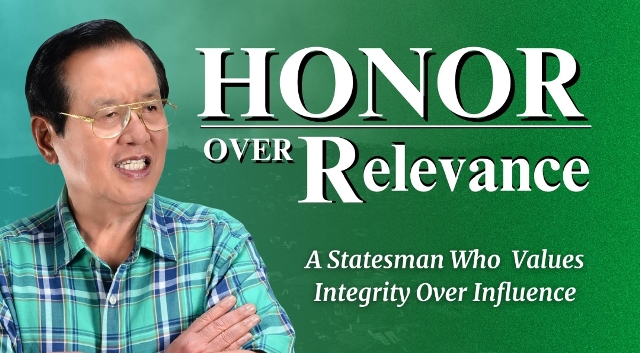Honor Over Relevance

A Statesman Who Values Integrity Over Influence
Oh yes, letting go is never easy—whether it’s a cherished relationship, a prized possession, or, more dangerously, power, fame, and wealth. The deeper the attachment, the harder the release, and for some, the grip only tightens, often leading to one thing—greed.
Take, for instance, politicians who, after suffering a bitter defeat at the polls, refuse to fade into the background. Clinging to the past, they reemerge, declaring unfinished business, vowing that their return is not for personal gain but for the people. Yet, beneath these proclamations often lies an insatiable hunger—not just for service, but for control, influence, and redemption in the eyes of history.
True leadership is not measured by how long one holds power but by the legacy left behind. Those who truly serve understand when to step aside, allowing fresh voices and new perspectives to shape the future. But for those who cannot let go, who see loss as a mere setback rather than a message from the people, the cycle of ambition continues—sometimes at the cost of progress itself. Perhaps the real question is not whether they deserve a second chance, but whether their return serves the people or simply serves their own unyielding desire for power.
This takes us back to a time when a well-respected politician chose to honor the will of the people, stepping aside with dignity after losing to fresh faces in the political arena. Rather than clinging to power or challenging the outcome, he embraced the voice of the majority, retreating into the background with quiet resolve. Not a trace of bitterness, not a whisper of resentment—only the graceful acceptance of a true statesman.
A shining example of the adage “Magnanimous in victory, gracious in defeat,” former Mayor and Congressman Bernie Vergara embodied the essence of genuine leadership. Unlike others who cling to titles as if they were birthrights, he never anointed himself with the self-imposed label of “lifetime chairman” of a festival in Baguio. Instead, he understood that true service is measured not by the length of one’s tenure, but by the integrity with which one serves—and the humility with which one steps aside.
In an era where many fight tooth and nail to reclaim lost power, Vergara’s quiet exit stands as a testament to the rare virtue of political grace. His legacy is not just in the positions he held, but in the example he set: that leadership is not about holding on, but about knowing when to let go.
Being accorded the title of “lifetime Chairman” of a festival in Baguio is an honor bestowed, not a right to be claimed—especially in the realm of politics, where leadership is meant to serve the people, not entrench oneself in power.
If one insists that there is still much to be done for the city we so dearly love, it begs the question: Why were these goals left unfinished during decades of incumbency? Shouldn’t years in office have been enough to lay the foundations, implement the plans, and leave a lasting legacy? Or is this simply an attempt to rewrite history, to justify a return to power under the guise of unfinished business?
True public service is not measured by how long one remains in office, but by the impact made while there. Leadership is not about indefinite rule, but about making way for new voices, fresh perspectives, and progress that transcends individual ambition. Those who genuinely serve do not cling to the past—they empower the future.
When comparing these two veteran politicians, the contrast is stark. One embodies the qualities of a true statesman—graceful in defeat, dignified in departure, and secure in the legacy left behind. The other, however, clings desperately to the remnants of power, self-entitled and unwilling to fade into the background.
While the statesman accepts the will of the people with quiet resolve, the other refuses to let go, seeking attention and justifying a return with claims of “unfinished business.” But if there was truly more to be done, why was it left undone during years—perhaps decades—of incumbency? Is this about serving the people, or serving personal ambition?
Leadership is not about how long one holds office, but about knowing when to step aside with honor. A true leader does not chase power; they build a legacy that speaks for itself. And when the time comes, they walk away—not with desperation, but with dignity.







